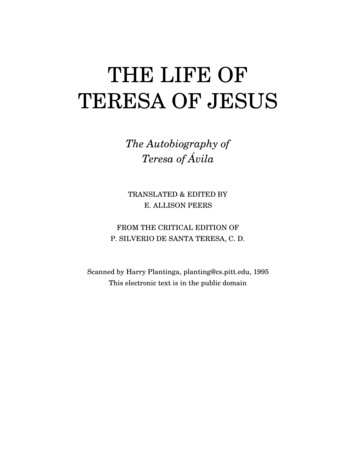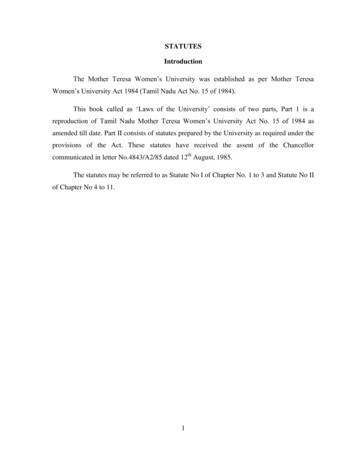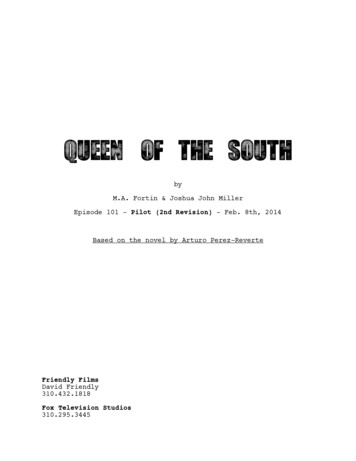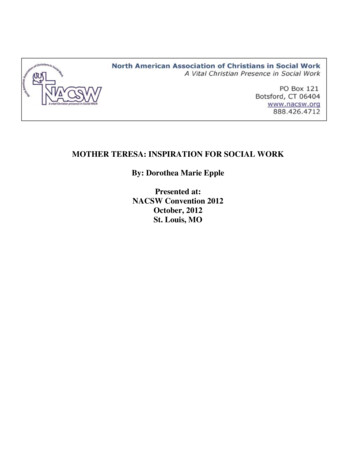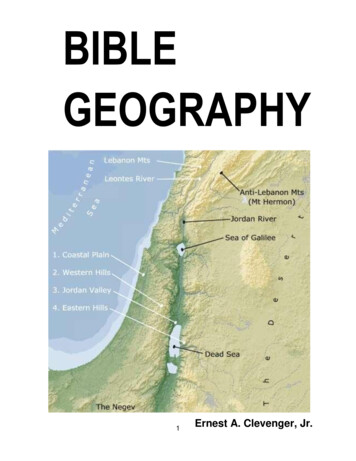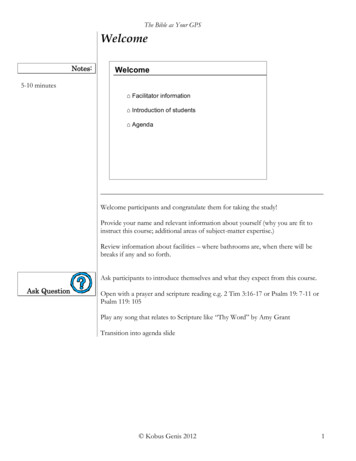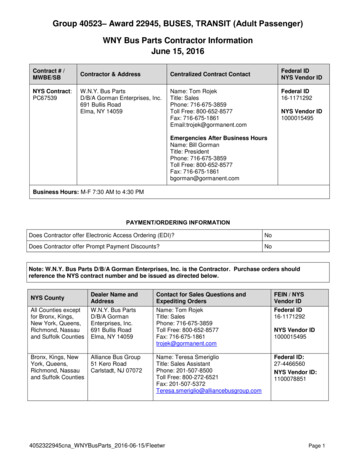
Transcription
Teresa’s Bible studies are some of the best on the market. Not only has she founda way to teach biblical truth with profound wisdom, but she does so in such awinsome and relatable way. This resource is a treasure!K AT A R M ST R O N G ,author of No More Holding Back and The In-Between PlaceTeresa, my pink-haired theologian, I want to hug you for writing these studies. Youhave shared practical, personal, and challenging ways to make the Bible come alive.When a smart woman chases after the heart of God, we all win.TRICIA LOT T WILLIFORD,author of You Can Do This and Just. You. Wait.In a noisy world filled with opinion, it can be difficult to cut through the clutterto find the voice of God and His vision for our lives. Plus, let’s face it . . . the Bibleis both intriguing and, at the same time, intimidating. Teresa does a beautiful jobof taking us into God’s heart by walking us through His Word. Her guided studiesare for any woman who is wrestling with a sense of direction and believing in herworth. By taking us through the Scriptures in a practical, personal, and powerfulway, she equips us to own our now and step boldly into our next.M A R S H A W N E V A N S D A N I E L S , Godfidence Coach, TV personality, reinvention strategist forwomen, founder of SheProfits.comWith a relatable voice, Teresa makes studying the Bible approachable for womenat any stage of faith. The Get Wisdom Bible Studies are a 360-degree look atGod’s Word with historical contexts, word studies, hands-on application, andcommentary for each day’s devotion. The studies are timely with varied messagesof practicing contentment, trusting God in hard times, and leading the nextgeneration. Teresa is serious about knowing God and how His character changesHis people—the reader is not only encouraged to learn but to live the truths inthese Bible studies.B A I L E Y T. H U R L E Y,author, blogger, and speakerGet ready for a Bible study that breaks the mold. Self-proclaimed “Bible nerd”Teresa Swanstrom Anderson has a passion for Scripture that is contagious. Butdon’t you dare think this is a nerdy approach to study. Her warm and approachablestyle feels like a conversation with a wise and humble friend. Along the way, shewill challenge you to pick up your Bible as she weaves linguistics, history lessons,and personal stories around a passage. I can’t wait to recommend this series towomen in our church.GREG HOLDER,lead pastor at The Crossing; author of The Genius of One and Never Settle
GET WISDOM BIBLE STU DIESLiving forWhat ReallyMatters7 Weeks in the Book ofPhilippiansA NavPress resource published in alliancewith Tyndale House Publishers
NavPress is the publishing ministry of The N avigators, an international Christian organizationand leader in personal spiritual development. NavPress is committed to helping peoplegrow spiritually and enjoy lives of meaning and hope through personal and group resourcesthat are biblically rooted, culturally relevant, and highly practical.For more information, visit NavPress.com.Visit the author online at teresaswanstromanderson.com.Living for What Really Matters: 7 Weeks in the Book of PhilippiansCopyright 2020 by Teresa Swanstrom Anderson. All rights reserved.A NavPress resource published in alliance with Tyndale House PublishersNAVPRESS and the NavPress logo are registered trademarks of NavPress, The Navigators, ColoradoSprings, CO. TYNDALE is a registered trademark of Tyndale House Publishers. Absence of in connectionwith marks of NavPress or other parties does not indicate an absence of registration of those marks.The Team: Don Pape, Publisher; Caitlyn Carlson, Acquisitions Editor; Elizabeth Schroll, Copy Editor;Libby Dykstra, Designer and IllustratorAuthor photograph by Dionna McCarthy, copyright 2019. All rights reserved.Cover and interior illustrations are the property of their respective copyright holders, and all rights arereserved. Cover and interior image by Libby Dykstra Tyndale House publishers; glasses mixov/Depositphotos; book hristianin/Depositphotos; directional arrow janjf93/Pixabay.Author is represented by Jana Burson of The Christopher Ferebee Agency, www.christopherferebee.com.Unless otherwise indicated, all Scripture quotations are from the ESV Bible (The Holy Bible, EnglishStandard Version ), copyright 2001 by Crossway, a publishing ministry of Good News Publishers. Used bypermission. All rights reserved. Scripture quotations marked MSG are taken from THE MESSAGE, copyright 1993, 2002, 2018 by Eugene H. Peterson. Used by permission of NavPress. All rights reserved. Representedby Tyndale House Publishers. Scripture quotations marked NASB are taken from the New American StandardBible, copyright 1960, 1962, 1963, 1968, 1971, 1972, 1973, 1975, 1977, 1995 by The LockmanFoundation. Used by permission. Scripture quotations marked NIV are taken from the Holy Bible, NewInternational Version, NIV. Copyright 1973, 1978, 1984, 2011 by Biblica, Inc. Used by permission.All rights reserved worldwide. Scripture quotations marked NRSV are taken from the New Revised StandardVersion Bible, copyright 1989 National Council of the Churches of Christ in the United States of America.Used by per mission. All rights reserved worldwide. Scripture quotations marked TPT are from The PassionTranslation, copyright 2017, 2018 by Passion & Fire Ministries, Inc. Used by permission. All rightsreserved. ThePassionTranslation.com. Scripture quotations marked VOICE are taken from The VoiceTM.Copyright 2012 by Ecclesia Bible Society. Used by permission. All rights reserved.Some of the anecdotal illustrations in this book are true to life and are included with the permission of thepersons involved. All other illustrations are composites of real situations, and any resemblance to peopleliving or dead is purely coincidental.For information about special discounts for bulk purchases, please contact Tyndale House Publishers atcsresponse@tyndale.com, or call 1-800-323-9400.ISBN 978-1-63146-998-5Printed in the United States of America267256245234223212201
For all women who are willing to live differently.Let’s step into authenticity and community,while lavishing love on others . . . because we’reall messy and yet Christ loves us anyway.
Let's ConnectTake a few moments to be replenished . . .so that you can pour into m.andersonGetWisdomBibleStudies.comI can’t wait to discover all God is doing to help you pursuea life that really matters though this study in Philippians. I’dlove to see and read all about it! Post using the hashtag#livingforwhatreallymatters on Instagram, Twitter, and/orFacebook so we can encourage one another as we gothrough this study.
Get to know TeresaTeresa Swanstrom Anderson is a blogger, author, speaker,and Bible study teacher. Teresa grew up in Seattle, but spent hermiddle school years in Guatemala and has a deep love for peoplein developing countries. Now living in Denver, Colorado, with herhusband and six children, she spends her days wiping off sticky counters, Instagramming, and blogging at teresaswanstromanderson.com.She is the author of Beautifully Interrupted and has published severalBible studies on her blog. The Get Wisdom Bible Studies are her firsttraditionally published studies, taking her passion for studying theBible and helping women to a broader audience.
ContentsINTRODUCTIONWEEK 1:1Living in Authenticity 13(Philippians 1:1-11)WEEK 2:Choosing Joy 57(Philippians 1:12-26)WEEK 3:Living Like Jesus 91(Philippians 1:27–2:18)WEEK 4:Rising Up 117(Philippians 2:19-30)WEEK 5:Watch and Learn 147(Philippians 3:1–4:1)WEEK 6:Live the Example 179(Philippians 4:2-9)WEEK 7:The Lord’s Provision 205(Philippians 4:10-23)ACKNOWLEDGMENTSAPPENDIXNOTES235237239
WEEK 1Living inAuthenticityPhilippians 1:1-1113
14.LIVING FOR WHAT REALLY MATTERSWEEK 1 Day 1READ ACTS 9I used to write out exactly what I was going to say when I broke upwith someone. One time in college, I wrote and rewrote my break- upmonologue for an entire week straight. I penned it during every class,every study break, and any other time I had a few minutes to myself.I had a really hard time telling people what needed to be said.Our buddy Paul, though? Not so much.In the book of Philippians, Paul has some hard conversations withthe church in Philippi. He says what needs to be said, encourageswhat needs encouragement, and corrects what need correcting. Pauldoesn’t sugarcoat anything.My husband is this way. He’s always quick to tell me when Ihurt his feelings or if my tone with the kids was harsher than I’dintended. He gives me ideas on how I can lead more effectively, andhe’s up front when he needs more us- time. Maybe that’s why I likePaul so much. After years of living with someone who gives it to mestraight, I understand the importance of real, authentic conversation.Sometimes these kinds of conversations are empowering. Sometimesthey’re not super fun. But since Ben’s words are coming from a placeof love, I know they’re not meant to harm. We meet in authenticityto help each other grow. Sweeping things under the rug or being passive- aggressive isn’t beneficial or healthy.If we want to be bold, dynamic women of God, we need to bewilling to fight for authenticity in community. We have one life to live— one shot to make a mark on this earth in the name of JesusChrist. And with Paul as our teacher, we’ll learn how to do that.But if we’re going to learn from Paul, we need to first understanda bit more about who this man is. Now, I do realize you may knowPaul’s backstory already, but as we walk through it again, God may
Living in Authenticity.15point something out to you that somehow reflects and refracts differently today. God likes to highlight things at certain times, as Hewants you to know, learn, and grow.In Acts, we learn that Saul (Paul’s original Hebrew name)hated those who believed that Jesus was the Messiah. If we look atPhilippians 3:5, we can get a sense why he felt this way: Not only washe from a Jewish family, but he was a devout and legalistic Pharisee.This new faith seemed like heresy to him.1. What does Acts 9:1-2 say about Saul?Saul’s conversion is incredible. God intervenes in a dramatic andsupernatural way— and He steps into the path of someone no onethought would ever become a Christian.Do you know someone like that? A person you’ve been prayingfor, and yet it just seems so unlikely that they’d turn from their current lifestyle and become a new creation? But the beginning of Paul’sstory tells us something extraordinary: We serve a limitless God whooften does the unlikely.History LessonWe know that God changed Abram’s name to Abraham (Genesis 17:5), Sarai to Sarah (Genesis 17:15), and Jacob to Israel(Genesis 32:28). And most of us probably thought God did thesame to Saul, whom we know as Paul in the New Testament.But is that really what happened? Let’s find out. When Jesus speaks to him on the road to Damascus,he addresses him as Saul: “Saul, Saul, why are youpersecuting me?” (Acts 9:4).
16.LIVING FOR WHAT REALLY MATTERS When Ananias speaks to him after his conversion, he alsocalls him Saul: “Brother Saul, the Lord Jesus who appearedto you on the road by which you came has sent me sothat you may regain your sight and be filled with the HolySpirit” (Acts 9:17). When Paul was called out before his first missionary trip,the Holy Spirit refers to him as Saul: “Set apart for meBarnabas and Saul for the work to which I have calledthem” (Acts 13:2).In fact, after his conversion, Paul is referred to as Saul fourteen times!1 Hmm. So . . . what’s the deal? Why did his namechange?The shift from Saul to Paul happens as he sets sail for hismissionary journeys. In Acts 13:9, we see Saul is called “Paul”for the first time on the island of Cyprus, which is much laterthan his conversion. Luke, the author of Acts, indicates in thisverse that these two names are interchangeable: “But Saul,who was also called Paul, filled with the Holy Spirit, lookedintently at him.”Saul was the Hebrew form of his name; Paul was theRoman form. He uses the name Paul as he continues to traveland share the Good News of Jesus to mostly non- Jewishindividuals throughout the Mediterranean. The shift in namesis a sign of Paul’s desire to be approachable in the way heshared the gospel, using language and even his name ina way unique audiences could relate to (see 1 Corinthians9:19-23).2In Acts 9:10-11, we see God ask a man named Ananias to dosomething that seemed crazy: to go meet up with Saul. Ananiasknows of this man named Saul of Tarsus and all the horrible thingshe’s been a part of in and around Jerusalem. In fact, the first time we
Living in Authenticity.17hear Saul’s name in the Bible is during the stoning of Stephen, thefirst Christian martyr:Then they cast him out of the city and stoned him. And thewitnesses laid down their garments at the feet of a youngman named Saul.ACTS 7:58Can you imagine being asked to meet with this kind of man?Ananias probably felt like he was being asked to go to his death!2. How does Ananias initially respond to God?3. How does the Lord reply to Ananias’ concern? (Hint: See verses15-16.)God knows something Ananias doesn’t: The man who had spentso much time persecuting Christians is now a completely new person.4. Flip over to 2 Corinthians 5:17. What happens when we followJesus?
18.LIVING FOR WHAT REALLY MATTERSYou can make yourself better, but only Christ can make you new.And if ever there was someone who became a new creation, it wasPaul.So what exactly does new mean, anyway? Let’s go to the BLB appto find out. Head to 2 Corinthians 5 and click on verse 17. Tap onthe Interlinear and scroll down to find the word new or kainos (καινός,pronounced kai-nos).† Click on the word to find English synonymsand descriptions from Outline of Biblical Usage, Strong’s Definitions,and Thayer’s Greek Lexicon, as well as all the other New Testamentverses that use kainos.5. Pen down what kainos means:I absolutely love how Thayer’s Greek Lexicon explains thisword: “recently made, fresh, recent, unused, unworn.”3 So often asChristians, we talk about being restored . . . but this verse revealsthat we’re more than restored. Restored would mean we’re just a n ew- and- improved version of what we were before. But this verse here in2 Corinthians tells us that no matter what we’ve done or how we’velived, in Christ, we are brand new.What does that tell us about Paul? When he chose to follow Jesus,his history against the church was wiped out, wiped clean. It doesn’tmean there weren’t consequences (like having to build trust and demonstrate the authenticity of his newness to Ananias and a multitudeof believers), but in God’s eyes, there is no before— there is only nowand evermore.† In random order, the theme of these answers are: declares his confidence in God, complains of his circumstances,sings praise to God, lifts his heart in prayer.
Living in Authenticity.196. If Paul was made completely new the moment he chose to follow Jesus, why do you think Jesus blinded Paul? Just share yourbest guess.Paul’s blindness could only be explained as an encounter with JesusChrist Himself. And being blind allowed Paul to live un distractedfor several days. He likely played and replayed the experience in hishead and reflected on all his years of misunderstanding what it meantto truly love and follow God. But I don’t think that’s all. I wonder ifJesus was using literal blindness to show Paul that he had been livinga life of spiritual blindness. As Paul’s sight was restored, so was hisrelationship with Jesus and his understanding of his new life with theCreator of the universe.History LessonThe New Testament is comprised of twenty- seven books, thirteen of which are attributed to Paul. Additionally, about halfof the book of Acts (written by Luke) is filled with stories ofPaul’s life and works. Scholars debate whether Paul also wroteHebrews. If he did, he would have contributed fourteen books(or 51.85 percent of the entire New Testament!). Of theseepistles, only seven are accepted as “being entirely authenticand dictated by St. Paul himself.” The others are thought tohave been written by others on behalf of this dynamic apostle.4Paul was obviously influential in spreading the gospel in thedays of the early church.
20.LIVING FOR WHAT REALLY MATTERSDATEEPISTLECONTEXTAD 52–531 and 2 Thessaloniansafter second missionaryjourney beganAD 57–581 and 2 Corinthians, Galatians,and Romansafter third missionaryjourney beganAD 62Ephesians, Philemon,Colossians, and Philippiansduring Paul’s first RomanimprisonmentAD 631 Timothy and Titusafter being acquittedAD 662 Timothyduring Paul’s secondRoman imprisonmentAs we consider Paul’s “newness”— and by extension, the being- made- new that each of us experiences when we follow Jesus— wemight find ourselves wondering how this utter transformation happens. Look again at Acts 9:15. God told Ananias, “He [Paul] is a chosen instrument of mine.” When I look at this verse in the Interlinearsection of the BLB, I see that instrument (skeuos; σκεῦος, pronouncedskyoo-os) also means “vessel.”5 Like the white geometric vase on mydesk, which is filled with beautiful flowers, a vessel contains something. Is filled with something. God hand- selected this vessel (Paul)that once contained judgment and pharisaical law, removed his spiritual blindness, and made him new . . . and now the vessel is filledwith the Holy Spirit. We know from Galatians that as we are filledwith the Holy Spirit, we pour out the fruit of the S pirit— which isthe very character of God.7. What fruit of the Spirit might you expect to see emerge inPaul’s writings? (Hint: See Galatians 5:22-23.)
Living in Authenticity.21The book of Philippians gives us a vivid picture of the fruit of theSpirit, as Paul writes to his Philippian friends about living alignedwith the Good News of Jesus: love, not legalism; unity, not discord;authentic faith, not counterfeit religion.When Paul’s eyesight returned, he saw the world with new eyesbecause he truly was a new creation. Gentiles ( non- Jews) that heonce despised and looked down on became his friends. The body ofChrist (the early church) that he once persecuted became his family.Nothing was the same after his encounter with Jesus. Sharing thegospel of Jesus Christ became his only goal, and he willingly leftthe safety of his old life to share the Good News with the world.Three missionary journeys took him through areas of the globewhere people had yet to hear the name of Jesus, and he faced almostconstant danger:Three times I was beaten with rods. Once I was stoned.Three times I was shipwrecked; a night and a day I wasadrift at sea; 26 on frequent journeys, in danger from rivers,danger from robbers, danger from my own people, dangerfrom Gentiles, danger in the city, danger in the wilderness,danger at sea, danger from false brothers; 27 in toil andhardship, through many a sleepless night, in hunger andthirst, often without food, in cold and exposure.252 CORINTHIANS 11:25-27If we flip back over to Acts 9:16, we see that God let Ananias inon what lay in store for this m urderer- turned- apostle. The Lord knewthat Paul would suffer “for the sake of [His] name.” Yet, because P aul- made- new was filled with love, joy, peace, patience, kindness, goodness, faithfulness, gentleness, and s elf- control, he could see God’sdeeper purpose in every struggle. The struggle was not beyond thereach of God, and every bit of pain was worth God’s Kingdom reaching the ends of the earth.
22.LIVING FOR WHAT REALLY MATTERSI’m sure Paul sometimes felt unqualified and inadequate in theface of such a difficult calling. But you know what? When we feelunqualified and inadequate, we can fully lean on the One who is ableto do all things.This is important for us to realize: If we feel capable and qualifiedfor God’s task, we’re probably leaning on our own power and abilityinstead of God’s, which means we’re either out of step with what He’sasking or we’re about to struggle mightily in pursuit of the calling.8. Do you feel capable and qualified in your calling? Where haveyou gotten comfortable, and do you think you might be missing something more that God is calling you to?God qualifies the called; He doesn’t call the qualified. That’s certainly true of Paul. He had participated in persecution and murderof God’s people. I’m sure he often felt massively over his head as hefaced persecution and prison.But guess what— being over our heads is a good thing. If we’reliving in self- reliance and self- sufficiency, we’ve made ourselves god.God wants us to join Him in His Kingdom work, and to be up tothat task, we have to recognize our insufficiency and lean on Hisultimate sufficiency.God doesn’t want us to simply look the part of a new creation— Hewants us to be a new creation. This newness equals freedom in Him.And freedom in Him creates opportunity. How do we make the mostof this freedom and opportunity? We give our whole self to Him.We open our hands and give our all to Him. We say the words “sendme”— even before we understand where and how we will be sent. Thisis the only way we are qualified: as vessels filled with the Holy Spirit.
Living in Authenticity.23Paul’s life was so radically changed after his encounter with Jesusthat his entire existence became about sharing the redeeming love ofthe Cross. Paul cared little about who others thought he should be,or about what he “gave up” in choosing to follow Jesus. Instead, Paulleaned into authentic truth, integrity, and unity. I love what JohnPiper says about Paul:He does not need my approval. He doesn’t fear my rejection.He does not have his finger in the air to discern how thewinds of culture are blowing. He is authentic.6Isn’t this the type of woman we want to be? I don’t want to dothings simply for the approval of others. I don’t want to fear rejectionor internet trolls. I don’t want to change my stance or my directionwith the winds of culture. I want to be authentic and live in authenticrelationships with others. And I have a feeling you do too.Spend some time in prayer, talking to God about places in yourlife where you struggle to live authentically. Ask Him to giveyou the trust and freedom to live wholly in who He has createdyou to be.Amen.
24.LIVING FOR WHAT REALLY MATTERSWEEK 1 Day 2READ ACTS 16:6-40I love seeing women of God making a difference for the Kingdom ofGod. And our heavenly Father does too. That’s why I was delightedwhen I realized that the Philippian church existed in part because ofseveral women who fell in love with Jesus. They hadn’t met Jesus, andthey hadn’t yet met Paul, but the Good News about Jesus had spreadto their city— and their hearts responded.Even before he met the women of Philippi, Paul saw women asvaluable partners in the gospel. Did you know that the first convertin Europe was a woman who founded the first European Christianchurch with Paul?7 (We’ll hear more about Lydia in a bit.) Womenweren’t included within the twelve disciples because these twelve wereto signify the twelve tribes of Israel, but on the day of Pentecost(when the Holy Spirit was poured out), God showed the world thatHe was doing something even bigger, empowering both men andwomen to spread the name of Jesus Christ:I will pour out my Spiriton every kind of people:Your sons will prophesy,also your daughters;Your young men will see visions,your old men dream dreams.When the time comes,I’ll pour out my SpiritOn those who serve me, men and women both,and they’ll prophesy.A C T S 2 :16 -17,msg
Living in Authenticity.25The people who led were men and women, converted Jew andGentile, circumcised and uncircumcised. We know God loves diversity, and we see that here as a new season unfolds. Nothing was thesame as it was before. Everything was new and uncharted.The New Testament indicates that the gospel radicallyaltered the position of women, elevating them to apartnership with men unparalleled in first- century society.Wherever the gospel went, women were among the first,foremost and most faithful converts. The gospel led themto engage in aspects of Christ’s service that went beyondthe cultural limitations of the day. As Ben Witherington IIIobserves, “In the post- Easter community we find womenassuming a greater variety of roles, some of which . . . wouldhave been forbidden to a Jewish woman (e.g., being ateacher of men in Acts 18:24-6).”8History LessonAnother female leader in the New Testament was Priscilla(she and her husband, Aquila, led a church in Ephesus— andlater, another one in Rome). If you read their story in Acts 18,you may have noticed that her name is usually mentionedfirst. This suggests she is the more noteworthy and prominentleader of the two. Priscilla is even listed first when she andher husband explained theology and doctrine to Apollos inActs 18:24-26. Paul specifically names this amazing coupleon several occasions (Romans 16:3-5; 1 Corinthians 16:19;2 Timothy 4:19). What an incredible woman Priscilla musthave been!
26.LIVING FOR WHAT REALLY MATTERSAs Paul headed out on his second missionary journey, he plannedto take the gospel to Asia. But in Acts 16, we learn that God put abig red light on Paul’s p lan— because He had bigger and better plans:They went to Phrygia, and then on through the region ofGalatia. Their plan was to turn west into Asia province, butthe Holy Spirit blocked that route. So they went to Mysiaand tried to go north to Bithynia, but the Spirit of Jesuswouldn’t let them go there either. Proceeding on throughMysia, they went down to the seaport Troas.9-10That night Paul had a dream: A Macedonian stoodon the far shore and called across the sea, “Come over toMacedonia and help us!” The dream gave Paul his map. Wewent to work at once getting things ready to cross over toMacedonia. All the pieces had come together. We knew nowfor sure that God had called us to preach the good news tothe Europeans.6-8ACTS 16:6-10,msgDid you notice verse 6 says the Holy Spirit “blocked” that route?The Greek word used here is κωλύω (pronounced kōlyō) and literallymeans “to hinder, prevent, forbid,” “to withhold a thing,” “to denyor refuse one a thing.”9 I don’t know how they understood Godwas blocking them. Perhaps they weren’t allowed entrance, or maybesomething in their gut told them not to proceed. Whatever the case,God didn’t want them in Asia at this point, and in a vivid dream, Hedirected Paul somewhere else.God has certainly blocked my way many times before. In mybook Beautifully Interrupted, I wrote about how the life I live nowis not the one I thought I wanted. My plan was to get a doctoratein art history, move to Europe, work as a curator at some fantasticmuseum . . . and kids? They weren’t in my five- year, ten- year, or reallyany- year plan.
Living in Authenticity.27But one day I realized I’d never consulted God in any of myplans. As the tattoo on my right wrist now reminds me, I prayed thewords “send me.” I wish God had told me exactly where to go— butinstead of knowing what to do, I almost immediately knew what Iwasn’t supposed to do. And that was continue pursuing art history.He most certainly blocked and forbade that route for me becauseHe had something bigger and more exciting. I see that now, lookingback. But at the time, I didn’t obey without dragging my feet.1. Has God ever blocked the path you were going down? Whathappened? How did you respond?As we continue reading, we learn that Paul and his travel buddiessailed for Samothrace, then on to Neapolis, and from there, theyhoofed it to Philippi. The Message says Philippi was “the main cityin that part of Macedonia and, even more importantly, a Romancolony,” and that they “lingered there several days” (Acts 16:11-12).On the day of Sabbath, Paul and his companions sought a placeto worship. They heard about a prayer meeting held along the river side, and so they found it and began to speak to the women who hadgathered there.2. Why do you think Paul and his companions didn’t go to asynagogue to pray and worship?
28.LIVING FOR WHAT REALLY MATTERSTo find our answer to this question, we’ll need to back up andlearn a little about the city itself.History LessonWhen they were attacked by Thracians, the inhabitants of thiscity, previously known as Krenides, sought protection fromPhilip II of Macedon (the father of Alexander the Great!). Knowing the land was rich in gold, Philip responded by capturingthe city himself circa 357 BCE (so much for looking to Philip forhelp!) and renamed it Philippi.Years later, after Mark Antony and Octavian took revengeon Julius Caesar’s assassins, Brutus and Cassius, Philippibecome a military outpost and Roman colony. Because the cityteemed with Roman troops, it was often referred to as “littleRome.”10S elf- governing and independent, Philippi was a bit of a meltingpot. Because no synagogue existed, we know that not even ten Jewishmales resided within the city limits. But, as Paul and his friends knew,when a city did not have a synagogue, those who loved God wouldmeet by the river to pray and worship.Lydia was likely a Gentile who had heard of the incredible nameof Jesus (John 12:20 shows that news of Jesus’ miraculous healingshad begun spreading to the people of Greece). She’s the only womannamed in this passage, so it’s likely that although she had never metJesus and had never been formally taught the gospel, she was leadingthe meeting.Isn’t it interesting that we don’t hear of any men at this prayermeeting, and yet Luke (the author of Acts) says, “We sat down andspoke to the women who had come together” (Acts 16:13)? In thosedays, Jewish men and women didn’t worship together. They even haddifferent sections in the synagogue. Once again, however, we see that
Living in Authenticity.29tide changing within the community
With a relatable voice, Teresa makes studying the Bible approachable for women at any stage of faith. The Get Wisdom Bible Studies are a 360-degree look at God's Word with historical contexts, word studies, hands-on application, and commentary for each day's devotion. The studies are timely with varied messages
